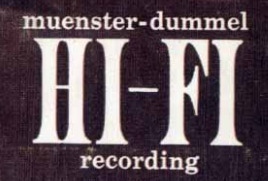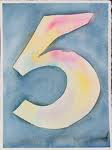main: June 2010 Archives
Benny Powell, the veteran trombonist, died last Saturday in New York. Born in New Orleans, Powell was treasured by his colleagues as a superb musician and teacher and as a gentleman who observed old-South standards of courtesy and consideration.
Among the bands that Powell graced were those of Count Basie, Thad Jones and Mel Lewis, Bill Holman, Benny Goodman, Duke Pearson and Terry Gibbs. Here he is playing the blues in the company of a few of his admiring colleagues: Dizzy Gillespie and Harry "Sweets" Edison (tp), Clark Terry (flh), James Moody and Buddy Tate (ts), Gene Harris (p), Freddie Green (g), Ray Brown (b), Grady Tate (d). Powell has the first solo in this excerpt from a festival in Switzerland in 1985.
Go here for a video montage that captures Benny Powell in several of his roles. DevraDoWrite has news of plans for his services.
As always, the Rifftides staff is trying to keep up with new releases. It can't be done; the inflow never ceases and listening time is at a premium, but in the next few days we'll alert you to a few.
Linda Ciofalo, Dancing With Johnny (Lucky Jazz Music). The dancing partner of the title is Johnny Mercer. Ciofalo applies her smooth, rangy voice and flexible phrasing to some of his best-known lyrics. She interprets Mercer beautifully, capturing the joy and irony he intended in "Tangerine," the ache in "Early Autumn" the tenderness of "I Remember You" and—throughout—the essences of 13 Mercer songs. Pianist John DiMartino heads the excellent rhythm section, which applies occasional Latin or rockish touches. On some tracks, trumpeter Bryan Lynch and saxophonist Joel Frahm provide ensemble support and superb solos. Melisma slightly overburdens some of Ciofalo's vowels. The drummer is heavy on the backbeat in spots. Those are minor distractions. This is a theme album worthy of its inspiration.
Ciofalo applies her smooth, rangy voice and flexible phrasing to some of his best-known lyrics. She interprets Mercer beautifully, capturing the joy and irony he intended in "Tangerine," the ache in "Early Autumn" the tenderness of "I Remember You" and—throughout—the essences of 13 Mercer songs. Pianist John DiMartino heads the excellent rhythm section, which applies occasional Latin or rockish touches. On some tracks, trumpeter Bryan Lynch and saxophonist Joel Frahm provide ensemble support and superb solos. Melisma slightly overburdens some of Ciofalo's vowels. The drummer is heavy on the backbeat in spots. Those are minor distractions. This is a theme album worthy of its inspiration.
Rifftides reader Dave Bernard sent this inquiry:
What did muenster-dummel mean on the Norgran record jackets?
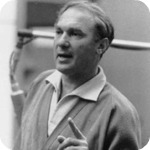 For those born after the LP era, the terms may draw a blank. Norgran was one of two labels founded by Norman Granz (1918-2001), who created Jazz At The Philharmonic in the 1940s. His other early label was Clef. Norgran and Clef eventually morphed ino Verve. Granz was a pioneer of the jazz concert and a tough, resourceful businessman. He guided the careers of Ella Fitzgerald and Oscar Peterson. He was an unyielding champion of racial equality. On JATP tours he fought back against bigoted bookers, promoters and police—and won. His mien was often dour. Whitney Balliett once wrote that he had "bullying eybrows."
For those born after the LP era, the terms may draw a blank. Norgran was one of two labels founded by Norman Granz (1918-2001), who created Jazz At The Philharmonic in the 1940s. His other early label was Clef. Norgran and Clef eventually morphed ino Verve. Granz was a pioneer of the jazz concert and a tough, resourceful businessman. He guided the careers of Ella Fitzgerald and Oscar Peterson. He was an unyielding champion of racial equality. On JATP tours he fought back against bigoted bookers, promoters and police—and won. His mien was often dour. Whitney Balliett once wrote that he had "bullying eybrows."
Still, as Dan Morgenstern observed when we were discussing Granz yesterday, "Norman was not without a sense of humor." Granz found pretentiousness in the hifalutin' hype that record companies ground out about high fidelity, so he concocted a phrase that ended up on the covers of his Norgran and Clef albums.
Jack Dummel was Granz's favorite recording engineer. Muenster was his favorite cheese.
Looking around the internet for related information, I came across this audiophile chat list entry from a record collector excited about finding an old Billie Holiday album:
I found this gem at goodwill today. It needs some more cleaning but sounds pretty good. It says at the top-right Muenster-Dummel hi fi recording so I'm thinking it is a German recording.
Norman might have managed a smile.
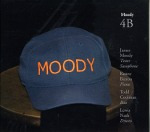 James Moody, 4B (IPO). According to the evidence on this CD due for release in early August, Moody at 85 is undiminished in energy, endurance, chops and harmonic imagination. In the companion to last year's 4A, the winner of the JJA's 2010 lifetime achievement award moves at deliberate speed— swinging—through jazz and standard classics including "Take The 'A' Train," "Hot House," "But Not For Me," "Bye Bye Blackbird" as a waltz, and compositions by Kenny Barron and Todd Coolman. Barron, on piano, and bassist Coolman reconstitute two
James Moody, 4B (IPO). According to the evidence on this CD due for release in early August, Moody at 85 is undiminished in energy, endurance, chops and harmonic imagination. In the companion to last year's 4A, the winner of the JJA's 2010 lifetime achievement award moves at deliberate speed— swinging—through jazz and standard classics including "Take The 'A' Train," "Hot House," "But Not For Me," "Bye Bye Blackbird" as a waltz, and compositions by Kenny Barron and Todd Coolman. Barron, on piano, and bassist Coolman reconstitute two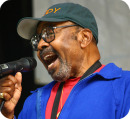 thirds of Moody's superb 1980s rhythm section. The impeccable Lewis Nash is the drummer. Nash's solo on "Take the 'A' Train" is a highlight. All hands get plenty of solo time. Throughout, Moody plays the tenor saxophone, his preferred horn. The proceeding has the air of a high-level jam session. That is a compliment. As usual with Moody, joy predominates.
thirds of Moody's superb 1980s rhythm section. The impeccable Lewis Nash is the drummer. Nash's solo on "Take the 'A' Train" is a highlight. All hands get plenty of solo time. Throughout, Moody plays the tenor saxophone, his preferred horn. The proceeding has the air of a high-level jam session. That is a compliment. As usual with Moody, joy predominates.
Fred Anderson, who exemplified the Chicago avant garde as a tenor saxophonist and as a club owner gave it work, has died at 81. The Chicago Tribune's Howard Reich followed Anderson's career. He writes in the newspaper:
His was a rigorous, demanding brand of jazz improvisation that bridged the bebop idiom of Charlie Parker (an Anderson hero) with the "free jazz" experiments of the 1960s and thereafter. The fast-flying phrases and blues-driven energy of bebop converged with the non-chordal, anything-goes song structures of "free jazz" in Anderson's best work.
Whenever Anderson held the stage, he famously leaned forward a bit, unleashing torrents of notes, one phrase cascading atop another, solos often unfolding over a Herculean 20 minutes or more. Even at his 81st birthday show, last March at his beloved Velvet Lounge, the man packed an avalanche of ideas into every soliloquy.
Reich's obituary of Anderson includes a video interview. To read it, go here.
This brief, rather disjointed, promotional video for his Timeless DVD gives you Anderson playing at his beloved Velvet Lounge and talking about his early career.
Tom Varner, Heaven and Hell (Omnitone). When Varner moved from New York to Seattle in 2005, he left behind none of his French horn virtuosity, compositional skill or avant-garde daring. Heaven and Hell is his meditation on changes in the world and in his life since the 9/11 attack, and on the evolution of his approach to music. The 15-part suite reflects a sensibility that is at home with the influences of, among others, Gil Evans and his fellow arrangers for the Miles Davis nonet, Stravinsky, Ligeti, Mingus and—in a startling segment titled "Birds and Thirds"—the power of triadic ensemble chord voicings that might have come straight from Brahms.
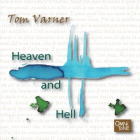 Varner's lapidary skill in the written sections is complemented by interludes of collective free improvisation connecting the principle movements. Throughout, in addition to the strength of Varner's audacious French horn, there are superior interpretation and improvisation from trumpeter Russ Johnson; trombonist Chris Stover; clarinetist Jesse Canterbury; saxophonists Saul Cline, Hans Teuber, Mark Taylor, Eric Barber and Jim DeJoie; bassist Phil Sparks; and drummer Byron Vannoy. Johnson is a New Yorker. All of the others are from Seattle. Their excellence emphasizes one of the underground secrets in jazz; the rainy city is one of today's strongholds of adventuresome creativity.
Varner's lapidary skill in the written sections is complemented by interludes of collective free improvisation connecting the principle movements. Throughout, in addition to the strength of Varner's audacious French horn, there are superior interpretation and improvisation from trumpeter Russ Johnson; trombonist Chris Stover; clarinetist Jesse Canterbury; saxophonists Saul Cline, Hans Teuber, Mark Taylor, Eric Barber and Jim DeJoie; bassist Phil Sparks; and drummer Byron Vannoy. Johnson is a New Yorker. All of the others are from Seattle. Their excellence emphasizes one of the underground secrets in jazz; the rainy city is one of today's strongholds of adventuresome creativity.
Among the many highlights is Sparks' and Vannoy's bass/drum conversation in "The Trilling Clouds," with the typically reserved Sparks going farther out than I have ever before heard him. Another is the saxophone pas de trois among Teuber, Taylor and Barber in "Waltz for the Proud Tired Worriers." Strategically placed in solo and ensemble is Varner's astonishing horn, featuring one of the most capacious low registers ever heard on the instrument. The ache and agony expressed in Varner's composing and the soloists' statements in "Structure Down" are at the heart of the work. This music, in all of its starkness and loveliness, should be heard as a continuum. Taken piecemeal, it would lose its cumulative impact.
The following news release arrived late yesterday:
The National Endowment for the Arts (NEA) today announced the recipients of the 2011 NEA Jazz Masters Award--the nation's highest honor in this distinctly American music. For the first time in the program's 29-year history, in addition to four individual awards, the NEA will present a group award to the Marsalis family, New Orleans' venerable first family of jazz. All of the 2011 recipients will be publicly honored at the annual awards ceremony and concert on January 11, 2011 at Frederick P. Rose Hall, home of Jazz at Lincoln Center, and receive a $25,000 fellowship award.
The 2011 NEA Jazz Masters are:
Hubert Laws Flutist
David Liebman Saxophonist, Flutist, Composer
Johnny Mandel Composer, Arranger, Trumpeter, Trombonist
Marsalis Family:
Ellis Marsalis, Jr. Pianist, Educator
Branford Marsalis Saxophonist, Composer, Bandleader
Wynton Marsalis Trumpeter, Composer, Educator, Bandleader
Delfeayo Marsalis Trombonist, Producer
Jason Marsalis Percussionist, Vibraphonist
Orrin Keepnews, a jazz producer and author from El Cerrito, California, will receive the 2011 A.B. Spellman NEA Jazz Masters Award for Jazz Advocacy.
Rifftides reader Deborah Hendrick e-mailed the following question:
I have noticed that when talking about Louis Armstrong, musician Wynton Marsalis carefully, almost deliberately, pronounces "Louis" as Lou-iss, not Lou-ee, which is how I usually hear the name.
How did Armstong pronounce his name?
He invariably pronounced it Louis, not Louie, as he demonstrates here, with help from a friend.
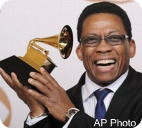 Fellow artsjournal.com blogger Larry Blumenfeld is in The Wall Street Journal with a piece about Herbie Hancock. His article addresses the pianist and composer's latest excursion into the arena of popular music in which he won a Grammy a couple of years ago. In fame and societal impact, Hancock has come a long way from Miles Davis, Maiden Voyage and other accomplishments of the 1960s that made him one of the most respected musicians of his generation. Blumenfeld concentrates on what Hancock sees on the wide horizon.
Fellow artsjournal.com blogger Larry Blumenfeld is in The Wall Street Journal with a piece about Herbie Hancock. His article addresses the pianist and composer's latest excursion into the arena of popular music in which he won a Grammy a couple of years ago. In fame and societal impact, Hancock has come a long way from Miles Davis, Maiden Voyage and other accomplishments of the 1960s that made him one of the most respected musicians of his generation. Blumenfeld concentrates on what Hancock sees on the wide horizon.
With "The Imagine Project," Mr. Hancock leverages both his talent and his pop-culture equity in the service of a larger idea. He mentions how a growing economic crisis and recent concerns about climate change have fostered an awareness of globalization. "These things force people to think about how connected we all are," he says over the phone from his Los Angeles studio, "but in a negative way. So I wanted to find a way to use music as a vehicle for that idea, in a positive light."
If Mr. Hancock sounds like a cultural ambassador, that's because he is one: When we spoke, he'd just returned from Beijing, in his role as chairman of the Monk Institute, under the auspices of the State Department; soon he'd be in the East Room of the White House, among the celebrities singing "Hey Jude" as President Barack Obama presented Paul McCartney with the Library of Congress Gershwin Prize for Popular Song.
To read the article, go here.
I admire and encourage Hancock's aspirations to cultural diplomacy through world music. But as I listened to "Don't Give Up," a song from his new album that is embedded in the WSJ article, I read a quote that he gave Blumenfeld:
"The first thing that came to mind when I thought of making another record," he says, "was simply 'Why? What can it accomplish?'"
The implication in that question is that he accomplished what he could in—for lack of a more precise term—mainstream jazz. It brought to mind the great alto saxophonist Phil Woods a few years ago as he contemplated the pervasive commercial success of his former boss and old pal Quincy Jones. "...but," Woods said plaintively, "couldn't he make a jazz record once in a while?"
If Herbie Hancock made a latterday counterpart of Maiden Voyage, Fat Albert Rotunda or 1+1, I—and perhaps others— would eagerly accept it along with his ambassadorship.
As long as the YouTube benefactor in Holland keeps posting new segments from that 1972 Dave Brubeck concert in Rotterdam, Rifftides will keep bringing them to you. The piece that just popped up, "Someday My Prince Will Come," was a staple in the classic Brubeck quartet's repertoire before it disbanded in 1969. Paul Desmond reaches into what he would no doubt refer to as his bag of tricks for a brilliant use of repetition (which amuses Alan Dawson), one of his celebrated duets with himself, blues references, and the all-but-inevitable quote from "Give a Little Whistle." Brubeck lyrically builds his solo with single-note lines, then generates a head of steam that barely subsides before the tune ends. Along the way, he draws Dawson and Jack Six into a concentrated bit of the metric play that had a good deal to do with making him famous. Watching this band have a good time, it's hard not to have a good time.
Previous installments of the Brubeck Rotterdam concert are here, here and here.
The Rifftides staff could think of no more appropriate way to observe the holiday than with Earl "Fathah" Hines (1903-1983). Here he is at the Berlin Piano Jazz Workshop in 1965 with Niels Henning Ørsted-Pedersen on bass and an unidentified drummer who looks like Alan Dawson. The piece is Eubie Blake's "Memories of You," one of Hines' favorites for decades.
At the Berlin workshop, Hines was the leadoff man in a blues-in-C relay, followed by Teddy Wilson, John Lewis, Lennie Tristano, Bill Evans and Jaki Byard—a stylistic progression of pianists who owed him plenty.
The Rifftides blogroll, known as Other Places, has been a hodge-podge. The staff finally slumped into action and arranged it into categories. We added a few entries and deleted some that died or became inactive. It's a work in progress, but at least it's easier to navigate now.
Oh, you want to know where it is. It's at the end of the middle column.
Bill Charlap & Renee Rosnes, Double Portrait (Blue Note). When Charlap and Rosnes married in 2007, it was logical 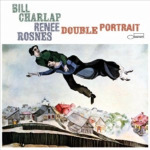 to expect that an album of duets would follow. Now, it's here, the collaboration of two of the most complete pianists in any genre of music. Considerations of domestic compatibility aside, piano duos that involve improvisation demand aspects of musicianship that go beyond technical ability. Among them is the capacity to anticipate and accommodate the partner's harmonic thinking and rhythmic proclivities. Without that crucial essential of artistry, train wrecks or—at the least—non-injury derailings are inevitable.
to expect that an album of duets would follow. Now, it's here, the collaboration of two of the most complete pianists in any genre of music. Considerations of domestic compatibility aside, piano duos that involve improvisation demand aspects of musicianship that go beyond technical ability. Among them is the capacity to anticipate and accommodate the partner's harmonic thinking and rhythmic proclivities. Without that crucial essential of artistry, train wrecks or—at the least—non-injury derailings are inevitable.
This happy couple has nary a mishap. Their intuitive control of the interlocking dynamics of two Steinways results in delicacy of tonal shadings in Wayne Shorter's "Ana Maria," Gerry Mulligan's "Little Glory" and Gershwin's "My Man's Gone Now," the longest and most achingly beautiful track in the album. It allows smooth and powerful locomotion in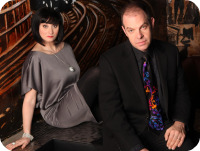 Joe Henderson's muscular "Inner Urge" and a joyful exchange of ideas in Antonio Carlos Jobim's "Double Rainbow." Rosnes and Charlap evoke an urge to samba (fast) in Lyle Mays's "Chorinho." "Dancing in the Dark" is evidence that a brisk tempo need not be the enemy of lyricism. Their twin cascade of sixteenth notes in the coda of that piece is a wonder of metric coordination. The title of Rosnes's "The Saros Cycle" alludes to the frequency pattern of lunar and solar eclipses, which may account for not only the piece's cyclical structure but also its air of celestial mystery. They conclude with sparks of whimsy in Frank Loesser's "Never Will I Marry." Throughout, the pianism and the creativity are at the highest level.
Joe Henderson's muscular "Inner Urge" and a joyful exchange of ideas in Antonio Carlos Jobim's "Double Rainbow." Rosnes and Charlap evoke an urge to samba (fast) in Lyle Mays's "Chorinho." "Dancing in the Dark" is evidence that a brisk tempo need not be the enemy of lyricism. Their twin cascade of sixteenth notes in the coda of that piece is a wonder of metric coordination. The title of Rosnes's "The Saros Cycle" alludes to the frequency pattern of lunar and solar eclipses, which may account for not only the piece's cyclical structure but also its air of celestial mystery. They conclude with sparks of whimsy in Frank Loesser's "Never Will I Marry." Throughout, the pianism and the creativity are at the highest level.
There has been a number of superb two-piano teams in jazz. To mention a few: Albert Ammons and Meade Lux Lewis; Hank Jones and Tommy Flanagan; Earl Hines and Jaki Byard; Don Ewell and Armand Hug; Chick Corea and Herbie Hancock; Dick Wellstood and Dick Hyman; and, of course, Bill Evans and Bill Evans. Charlap and Rosnes are in that company.
Over on JazzWax, Marc Myers has performed a public service by posting a fascinating account of the life of the gifted alto saxophonist Joe Maini (1930-1964). The piece addresses not only Maini's musicianship but also the inaccuracy of lingering reports about how he died. Marc enlists Maini's daughter in the telling. To read the article, go here.
But first, you may want to see and hear Maini play. The clip is from 1963, when it was still possible in some cities to regularly find live jazz on local television. Here is Joe Maini with Shorty Rogers' quintet, playing tenor rather than alto saxophone. Following a brief musical intro, the host, Frank Evans, speaks, then the band plays one of Shorty's tunes from his Martian period. The rhythm section is Pete Jolly, piano; Max Bennett, bass; and Mel Lewis, drums.
At the end of the JazzWax article, you'll find another video clip of the Rogers-Maini band.
In this clip, you'll hear Maini on alto sax with Jimmy Knepper, trombone; Bill Triglia, piano; Charles Mingus, bass; and Dannie Richmond, drums. It's from Knepper's 1957 album New Faces on the Debut label.
Two more pieces have emerged from the Dutch YouTube contributor who is posting segments of a remarkable Dave Brubeck concert in Rotterdam in 1972. The core unit was the Brubeck trio with bassist Jack Six and drummer Alan Dawson. Paul Desmond and Gerry Mulligan were the guest saxophonists on the Newport Jazz Festival tour.
Unlike many YouTube videos, these are of high visual quality and hold up in the full-screen mode. Don't miss Six and Dawson enjoying the metric play at 5:15 of the second clip. Despite the superimposed titles, these new entries are minus Desmond. They feature Mulligan. Brubeck introduces them.
Rifftides began life on June 15, 2005 with this item:
Launching Rifftides
Today is the first day of this new web log about jazz and, as its subtitle proclaims, other matters. At the top of the center column you will find a sort of manifesto, below that information about the proprietor. Farther down the center column under "Doug's Picks" are things I like that I hope you will like. I want this to be not merely a blog, but a diablog, so please respond with reactions. Your participation will be at least half the fun. There is an e-mail address under "Contact" in the center column. My intention is to post every weekday, and weekends when the spirit or events move me.Launching this venture, I would like to thank Terry Teachout, who suggested blogging as an alternative or supplement to the print straitjacket, and ArtsJournal commander Doug McLennan, who agreed to give Rifftides a home and helped me build it. Doug's a wizard.
Five years on, I have the privilege of also thanking the thousands of readers who have made possible the pleasures and rewards of this venture, not the least of which is Rifftides' recognition this week as the Jazz Journalist Association's blog of the year.
Please see the part above about the importance of the diablog and join in often with your comments and observations.
Onward.
At the Jazz Journalists Association awards ceremony in New York today, James Moody was honored for his lifetime achievement in jazz. Vijay Iyer was named musician of the year. Joe Lovano won in three categories; record of the year, small ensemble of the year and tenor saxophonist of the year. Maria Schneider was named composer of the year, Darcy James Argue up-and-coming musician of the year. Don Heckman won the award for lifetime achievement in jazz journalism.
To see the complete list of 41 winners, go here. Scroll way down and you'll see that Rifftides was honored in the blog category. The Rifftides staff is flattered to be in such company, We thank the members of the JJA and our loyal readers.
To my surprise, on the rare occasions when I divert from the main topic and post illustrated accounts of cycling excursions, Rifftides readers ask for more. Okay. This morning my Italian friend Vigorelli Bianchi took me 35 miles through farmland, orchard country and high desert. It is difficult with a camera to emphasize the hilliness of the hills. Take my word for it—they are hilly and they are long.

End of report. I need a nap. Have a good weekend.
 The latest Doug's Picks appear in the center column. They are:
The latest Doug's Picks appear in the center column. They are:
• CDs by two fiery alto saxophonists and a satisfying singer
• A concert DVD by the man who first poured jazz into a tenor sax
• A book that considers the shallowness of so much of the news we watch, hear and read—and what might be done about it
The Rifftides staff is feverishly preparing a new batch of Doug's Picks. (Well, all right, langorously preparing.) In the meantime, part three of that 1972 Brubeck concert in Rotterdam has appeared. If you have missed the previous installments, it's the Brubeck Trio with Jack Six, bass, and Alan Dawson, drums. Gerry Mulligan and Paul Desmond were guests on the Newport Jazz Festival tour. Here is "Take the 'A' Train," with notably muscular solos by Mulligan and Brubeck and Desmond in contrast with floating long tones.
The YouTube contributor who posted the Dave Brubeck-Paul Desmond-Gerry Mulligan "All The Things You Are" video we brought you last month promised that there would be more. He is as good as his word. The piece that Brubeck announces seems likely to be from his 1972 oratorio Truth Is Fallen, or in preparation for it. The work was inspired by a passage from Isaiah:
"And judgment is turned away backward, and justice standeth afar off: for truth is fallen in the street and equity cannot enter."—Isaiah 59:14
The YouTube screen information says that the concert was in 1971. My Brubeck sources say that it was in 1972 in Holland as part of a Newport Jazz Festival tour. But why quibble? Whatever the year, it's good to have this in such high quality. Jack Six is the bassist, Alan Dawson the drummer.
Manfred Eicher's ECM label, still celebrating the 40th anniversary it observed late last year, has reissued some of its landmark recordings. Many of them are on CD for the first time. Over the decades, ECM has achieved nearly infallible sound reproduction of a broad and eclectic range of musicians including such disparate label mates as Arvo Pärt, Andres Schiff, Keith Jarrett, John Cage, Kim Kashkashian, Iva Bittová, Johann Sebastian Bach and the Art Ensemble of Chicago.
broad and eclectic range of musicians including such disparate label mates as Arvo Pärt, Andres Schiff, Keith Jarrett, John Cage, Kim Kashkashian, Iva Bittová, Johann Sebastian Bach and the Art Ensemble of Chicago.
The label evolved with attention to core jazz and classical values side by side with a sonic expansiveness that led to an identifiable Northern European aspect of what was to become known as world music. Four of ECM's reissue sets are by artists who personified changes that moved through jazz in the 1970s. All of the musicians but one remain active, and all have built on the stylistic and popular success they developed with ECM.
Steve Kuhn, Life's Backward Glances (ECM). In his mid-thirties when Eicher persuaded him in 1974 to record the solo album Ecstasy, Kuhn had played piano for John Coltrane, Stan Getz, Art Farmer and Kenny Dorham. Eight years earlier, when he was the featured soloist in Gary McFarland's October Suite, he demonstrated that he thought beyond bop harmonies, with 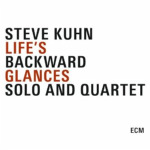 romantic expansiveness. Kuhn employed his massive technique to achieve the tenderness epitomized by "Silver" in the Ecstacy album. He was just as convincing with his power and controlled wildness, as in "Oceans in the Sky" from the quartet album Motility (1977), which features the atmospherics of Steve Slagle's soprano saxophone. Joining Ecstasy and Motility in the box is Playground (1979), the first recorded instance of Kuhn's celebrated partnership with Sheila Jordan. Unexpected from ECM, the audio mix occasionally all but obscures the intelligibility, but not the passion, of Jordan's singing in this collection of Kuhn's songs. Ironically, her voice has the greatest clarity in the wordless vocalizing on "Deep Tango."
romantic expansiveness. Kuhn employed his massive technique to achieve the tenderness epitomized by "Silver" in the Ecstacy album. He was just as convincing with his power and controlled wildness, as in "Oceans in the Sky" from the quartet album Motility (1977), which features the atmospherics of Steve Slagle's soprano saxophone. Joining Ecstasy and Motility in the box is Playground (1979), the first recorded instance of Kuhn's celebrated partnership with Sheila Jordan. Unexpected from ECM, the audio mix occasionally all but obscures the intelligibility, but not the passion, of Jordan's singing in this collection of Kuhn's songs. Ironically, her voice has the greatest clarity in the wordless vocalizing on "Deep Tango."
Kuhn's soloing and his interaction with bassist Harvie Swartz and drummer Bob Moses are exquisite in Playground. Kuhn has frequently recorded "Life's Backward Glance," which inspired the title of the box set. In Ecstasy, he introduces the song as a solo piano piece. In the quartet version with Jordan five years later, he gives it a lyric, and a home-key change. Kuhn's originality as a composer is evident in that piece, "Tomorrow's Thoughts," "The Rain Forest," "The Saga of Harrison Crabfeathers;" indeed, throughout all three CDs.
Keith Jarrett, Gary Peacock, Jack DeJohnette, Setting Standards (ECM).
Twenty-seven years ago, jazz was reaching, even flailing, in all directions. Despite a retro movement headed by Wynton Marsalis, many jazz musicians were determined to detach from a past represented by the songs of their parents and grandparents. Freedom from formal restrictions and concentration on original composition brought a deluge of individual material. It also brought stultifying boredom created by album after album of tunes by youngsters inspired by the inventiveness of the Chick Corea, Herbie Hancock, Tom Harrell generation but who were composers only in the sense that they were putting notes on paper. It is unlikely that pianist Jarrett, bassist Peacock and drummer DeJohnette set out in 1983 to preserve anything other than their own sense of stability in a shifting jazz scene. Still, their first albums of standards and the flow of the trio's concerts and CDs that followed emphasized what gifted players can do with the rich cache of great songs at the core of popular music.
Their success has encouraged jazz musicians everywhere to make the Great American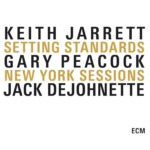 song book a living part of their repertoires. That's a public service. The Jarrett trio's recordings are a legacy of passionate, involved and—dare I use the word?—entertaining music. I haven't had a better time in weeks than listening again to the extended down-home romp the three develop in "God Bless the Child." Their interdependence, interaction and individuality seems to have formed spontanteously in these initial sessions in January of 1983. It has flourished ever since. After their interpretations of "Moon and Sand," "All the Things You Are," "If I Should Lose You" and eight other superior songs in Standards Vol. 1 and Vol. 2, the Changes album of original compositions follows logically in the same spirit. "Flying" and "Prism" remind us what a gifted composer Jarrett was. We may presume, if he decides to write again, that he still is.
song book a living part of their repertoires. That's a public service. The Jarrett trio's recordings are a legacy of passionate, involved and—dare I use the word?—entertaining music. I haven't had a better time in weeks than listening again to the extended down-home romp the three develop in "God Bless the Child." Their interdependence, interaction and individuality seems to have formed spontanteously in these initial sessions in January of 1983. It has flourished ever since. After their interpretations of "Moon and Sand," "All the Things You Are," "If I Should Lose You" and eight other superior songs in Standards Vol. 1 and Vol. 2, the Changes album of original compositions follows logically in the same spirit. "Flying" and "Prism" remind us what a gifted composer Jarrett was. We may presume, if he decides to write again, that he still is.
Gary Burton, Chick Corea, Crystal Silence (ECM). The original 1972 LP Crystal Silence became a model and inspiration for duo performances in modern jazz. The album melding Burton's vibraphone and Corea's piano followed a spontaneous concert performance by the two. It may have been inspired in part by pianist Bill Evans and guitarist Jim Hall in their albums Undercurrent (1962) and Intermodulation (1966). Burton and Corea were extravagant admirers of Evans and Hall. In any case, the pairing was so successful, it established a partnership that has thrived for nearly four decades and produced a body of chamber music that is among the most rewarding and—because of the virtuosity and ingenuity of the players—complex contemporary chamber music on record in any genre.
This box of four CDs brings Crystal Silence together with 1978's Duet and two discs of In Concert, recorded in Zurich the 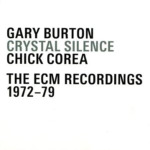 following year but never released complete until now. Many of the pieces included here have become jazz standards, among them "Falling Grace," "Arise, Her Eyes" and "I'm Your Pal," all by Steve Swallow; Burton's "Señor Mouse;" and "La Fiesta," "Bud Powell" and several "Children's Songs" by Corea. During the late 1960s and the '70s both Corea and Burton led or were involved in bands fusing jazz with other styles. Most of those projects, however successful musically, tend to sound dated because of the electronic keyboards and stringed instruments they used. Granted, Burton's vibes are electrified, but by the seventies their sound was an established element of the jazz landscape. Nearly forty years later, swirling, darting and jousting with Corea's piano, their freshness is undiminished. The restored concert material allows us to hear for the first time on record stunning solo performances by both musicians, Corea on "Love Castle," Burton in a medley of "I'm Your Pal' and "Hullo Bolinas."
following year but never released complete until now. Many of the pieces included here have become jazz standards, among them "Falling Grace," "Arise, Her Eyes" and "I'm Your Pal," all by Steve Swallow; Burton's "Señor Mouse;" and "La Fiesta," "Bud Powell" and several "Children's Songs" by Corea. During the late 1960s and the '70s both Corea and Burton led or were involved in bands fusing jazz with other styles. Most of those projects, however successful musically, tend to sound dated because of the electronic keyboards and stringed instruments they used. Granted, Burton's vibes are electrified, but by the seventies their sound was an established element of the jazz landscape. Nearly forty years later, swirling, darting and jousting with Corea's piano, their freshness is undiminished. The restored concert material allows us to hear for the first time on record stunning solo performances by both musicians, Corea on "Love Castle," Burton in a medley of "I'm Your Pal' and "Hullo Bolinas."
Eberhard Weber, Colours (ECM). Perhaps more than any other ECM artist, the German bassist Weber set what in many minds came to be the label's signature sound. The foundation was in the passionate and virtuosic way he played his electrified standup bass modified with an extra string, and in the sheer size of its amplified sound. In a way that created a sense of capaciousness, Eicher and his engineers mixed Weber's bass and Rainer Brüninghaus's synthesized keyboards with John Marshall's or John Christensen's drums and Charlie Mariano's soprano sax and assortment of flutes and exotic winds. At the same time, the recording technique etched the sound of each instrument to achieve crystalline definition. The music had intimacy but seemed to float in space. Weber's hypnotic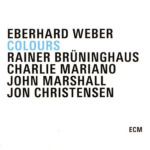 compositional style had much in common with minimalists like Steve Reich and Terry Riley. His music could be soporific, but at its frequent best, as in this set, it was compelling.
compositional style had much in common with minimalists like Steve Reich and Terry Riley. His music could be soporific, but at its frequent best, as in this set, it was compelling.
Weber's breakthrough album, The Colours of Chloë, is not included in this box, but it led him to form a working group and ultimately name his band Colours. The three albums in the set, Yellow Fields, Silent Feet and Little Movements, cover 1975 through 1980 and represent the ethos that intrigued such fellow musicians as Burton, Jaco Pastorius and John McLaughlin and endeared Weber to legions of listeners who might otherwise never have come near jazz. For dedicated jazz people, Mariano's fiery soprano sax work on pieces like "Left Lane" and "Seriously Deep," and the cymbal-splashed drumming of Marshall and Christensen, are likely to hold the most interest, but there is no denying the forceful pull of Weber's music. In a solo like that on "The Last Stages of a Long Journey," he makes clear that he was a formidable improviser. His 1980 "Little Movements" remains one of the most startling examples on record of humor wrapped into a serious piece of music. Weber is recovering from a 2008 stroke.
Steve Wilson, alto saxophone, and Lewis Nash, drums, playing Dizzy Gillespie's "Con Alma" at Lafayette College in Easton, Pennsylvania
With his permission, I occasionally steal from Bill Crow's "Band Room" column of anecdotes in the American Federation of Musicians Union Local 802 newspaper Allegro. The latest theft is below.
First, a preamble for those who have been living in a box for several decades: Maynard Ferguson (1928-2006) was a trumpeter who played extremely high and extremely loud.
David Lucas, who now lives in Boca Raton, sent me this one. In the late 1960's, Dave and Mike Abene went to the Metropole to hear Maynard Ferguson's band. Mike had been in Maynard's youth band. On the break, Dave and Mike went across the street to the Copper Rail, where many musicians hung out. A man was hunched over the bar who they recognized as Coleman Hawkins. They went over to say hello, and Mike asked, "Hawk, have you been across the street to hear Maynard?" Without looking up from his drink, Hawkins replied, "I don't have to go across the street to hear Maynard."
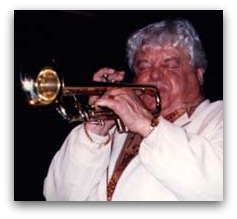 To see all of Mr. Crow's June column, go here. The Rifftides staff thanks him for his generosity.
To see all of Mr. Crow's June column, go here. The Rifftides staff thanks him for his generosity.
Bill Mays, on tour in Japan, sent a link to a Japanese web log called...
Rifftide:後藤 誠のJAZZ and other matters..
What a surprise. The blog seems to be operated by someone identified as Makotogotoh. If you go there—and if you know Japanese—you can read a review of a Mays performance with the guitarist Yoshiaki Masuo.
The more blogs the merrier, I guess; and good names are so hard to come by.
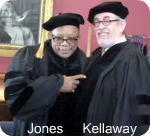 When Roger Kellaway isn't performing in a club or concert, or practicing and composing at home, chances are he's out collecting honors. Recently, he picked up two in the city where he grew up, Boston. For one event, he and his friend Quincy Jones dressed in black gowns and medieval hats to receive honorary doctorates from Kellaway's alma mater, the New England Conservatory of Music. For another, he heard his music played by the Boston Pops. The news may have been in all of the Boston papers, but we heard it by way of the semi-weekly newspaper in Ojai, Kellaway's longtime mountain valley home in Southern California. To read the story, go here.
When Roger Kellaway isn't performing in a club or concert, or practicing and composing at home, chances are he's out collecting honors. Recently, he picked up two in the city where he grew up, Boston. For one event, he and his friend Quincy Jones dressed in black gowns and medieval hats to receive honorary doctorates from Kellaway's alma mater, the New England Conservatory of Music. For another, he heard his music played by the Boston Pops. The news may have been in all of the Boston papers, but we heard it by way of the semi-weekly newspaper in Ojai, Kellaway's longtime mountain valley home in Southern California. To read the story, go here.
For a Rifftides review of a recent Kellaway album, see this Doug's Pick.
And from out of Kellaway's past, here he is accompanying Zoot Sims and soloing at the belated Donte's club in Los Angeles in 1970. Chuck Berghofer is the bassist, Larry Bunker the drummer. The tune is Ferde Grofe's "On The Trail."
For those still thinking about Paul Desmond, Iola Brubeck sent a lovely comment with a poem. To read it, click here.
Devotees of jazz and poetry or of poetry about jazz will want to read Ed Leimbacher's new entry on his I Witness blog. He wraps together several samples and a review of a poetry collection, and offers this:
Like any other art at its best, certain pieces about Jazz can make you "stop breathing" for a moment, reflecting emotion... thought... admiration... wonder.
To read the whole thing, see Jazzed, Everyone of Us. For a Rifftides archive post that touches on the topic, go here.
The form is not going to revolutionize either jazz or poetry but it is going to stay with us, and both jazz and poetry are going to have one new way of expressing themselves, and so are going to be just a little richer.—Kenneth Rexroth
I never drowned out one word of whatever Jack was reading or making up on the spot ... and he never drowned out or stepped on a word or interrupted a thought that I or anyone else had ... in these late night-early morning get-togethers.—David Amram on collaborating with Jack Kerouac
AJ Ads
AJ Blogs
AJBlogCentral | rssculture
Terry Teachout on the arts in New York City
Andrew Taylor on the business of arts & culture
rock culture approximately
Laura Collins-Hughes on arts, culture and coverage
Richard Kessler on arts education
Douglas McLennan's blog
Dalouge Smith advocates for the Arts
Art from the American Outback
Chloe Veltman on how culture will save the world
For immediate release: the arts are marketable
No genre is the new genre
David Jays on theatre and dance
Paul Levy measures the Angles
Judith H. Dobrzynski on Culture
John Rockwell on the arts
innovations and impediments in not-for-profit arts
Jan Herman - arts, media & culture with 'tude
dance
Apollinaire Scherr talks about dance
Tobi Tobias on dance et al...
jazz
Howard Mandel's freelance Urban Improvisation
Focus on New Orleans. Jazz and Other Sounds
Doug Ramsey on Jazz and other matters...
media
Jeff Weinstein's Cultural Mixology
Martha Bayles on Film...
classical music
Fresh ideas on building arts communities
Greg Sandow performs a book-in-progress
Harvey Sachs on music, and various digressions
Bruce Brubaker on all things Piano
Kyle Gann on music after the fact
Greg Sandow on the future of Classical Music
Norman Lebrecht on Shifting Sound Worlds
Joe Horowitz on music
publishing
Jerome Weeks on Books
Scott McLemee on books, ideas & trash-culture ephemera
theatre
Wendy Rosenfield: covering drama, onstage and off
visual
Public Art, Public Space
Regina Hackett takes her Art To Go
John Perreault's art diary
Lee Rosenbaum's Cultural Commentary
